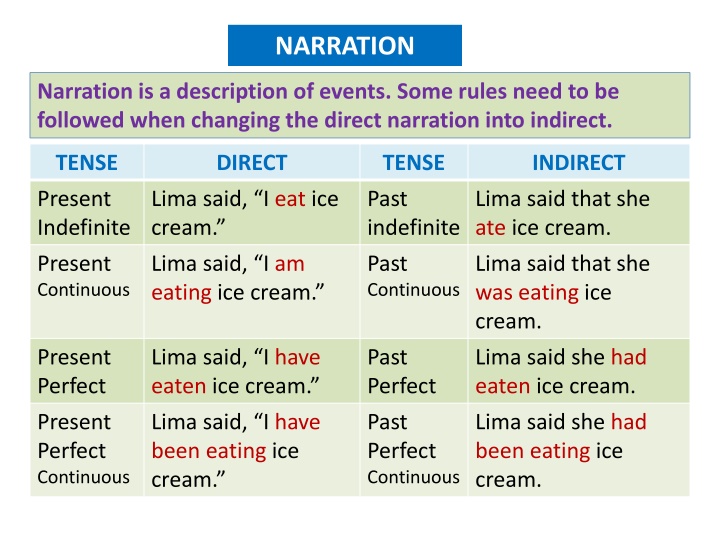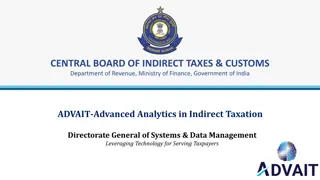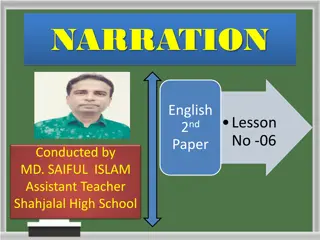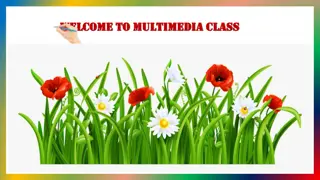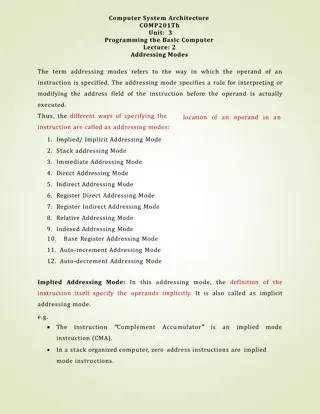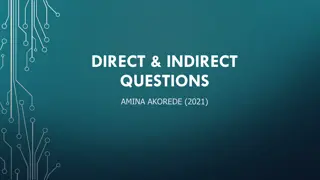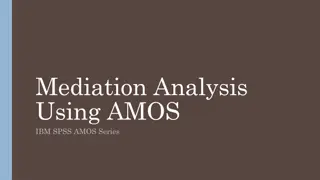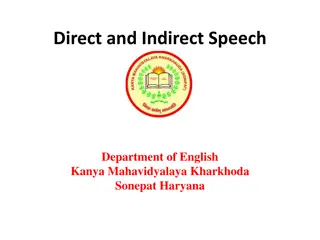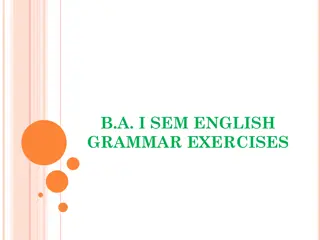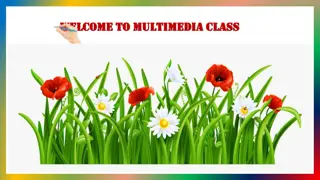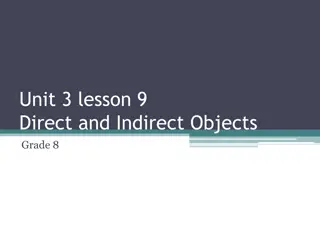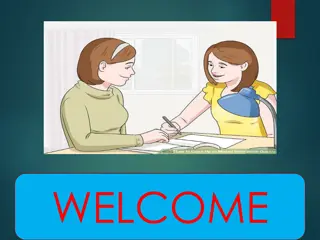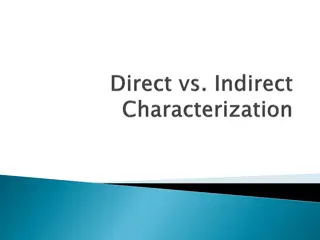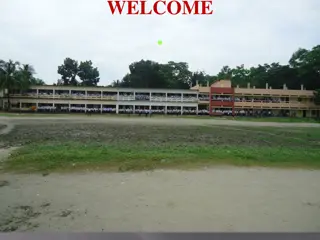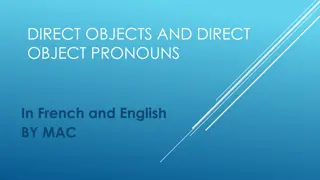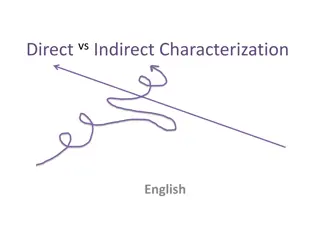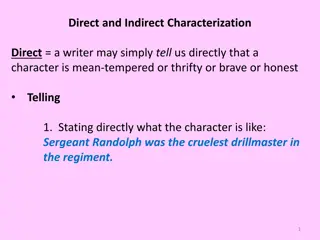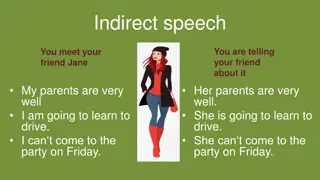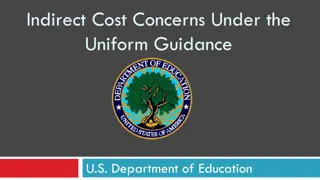Rules and Examples for Changing Direct to Indirect Narration
Description of events and rules for converting direct narration into indirect narration, including changes in tense, modals, expressions of time and place, and persons. Examples provided for each rule to help understand the concepts better.
Download Presentation

Please find below an Image/Link to download the presentation.
The content on the website is provided AS IS for your information and personal use only. It may not be sold, licensed, or shared on other websites without obtaining consent from the author.If you encounter any issues during the download, it is possible that the publisher has removed the file from their server.
You are allowed to download the files provided on this website for personal or commercial use, subject to the condition that they are used lawfully. All files are the property of their respective owners.
The content on the website is provided AS IS for your information and personal use only. It may not be sold, licensed, or shared on other websites without obtaining consent from the author.
E N D
Presentation Transcript
NARRATION Narration is a description of events. Some rules need to be followed when changing the direct narration into indirect. TENSE DIRECT TENSE INDIRECT Present Indefinite Lima said, I eat ice cream. Past indefinite Lima said that she ate ice cream. Present Continuous Lima said, I am eating ice cream. Past Continuous Lima said that she was eating ice cream. Present Perfect Lima said, I have eaten ice cream. Past Perfect Lima said she had eaten ice cream. Present Perfect Continuous Lima said, I have been eating ice cream. Past Perfect Continuous Lima said she had been eating ice cream.
TENSE DIRECT TENSE INDIRECT Past Indefinite Lima said, I ate ice cream. Past Perfect Lima said that she had eaten ice cream. Past Continuous Lima said, I was eating ice cream. Past Perfect Continuous Lima said that she had been eating ice cream. Lima said she had eaten ice cream. Past Perfect Lima said, I had eaten ice cream. Past Perfect Past Perfect Continuous Lima said, I had been eating ice cream. Past Perfect Continuous Lima said she had been eating ice cream.
Modals DIRECT Modals INDIRECT can Lima said, I can cook. could Lima said that she could cook. may Lima said, I may not come. might Lima said that she might not come. shall/ will must Lima said, I will buy a book. Lima said, I must do the work. would Lima said she would buy a book. Lima said she had to do the work. must/ had to Would, could, might and should are not changed. DIRECT INDIRECT Robi said, My father would smoke heavily. Robi said that his father would smoke heavily.
Expressions of time and place are changed. DIRECT INDIRECT now today then that day tomorrow the next day yesterday the previous day last night the previous night here there this that these come those go ago before thus so, in that way
CHANGE OF PERSONS The First Person of the direct speech is replaced by the speaker. Tonu said to Abir, I have finished my work. Tonu told Abir that she had finished her work. The Second Person of the direct speech is replaced by the listener. Tonu said to Abir, You are wasting your time. Tonu told Abir that he was wasting his time The Third Person of the direct speech remains unchanged. Father said to me, Mr. Anis Ahmed is an honest man. Father told me that Mr. Anis Ahmed was an honest man.
ASSERTIVE SENTENCE The Reporting Verb said is changed into told when it is followed by an object The Comma and Inverted Commas are replaced by the conjunction that Direct : Nabil said, I am fine. Indirect : Nabil said that he was fine. Direct : He said to me, I want to go. Indirect : He told me that he wanted to go. Direct : He said to me, I have learnt my lesson. Indirect : He told me that he had learnt his lesson. Direct : He said to me, I have been learning English. Indirect : He told me that he had been learning English.
EXERCISE Mim said, I am sick. Mim said that she was sick. Zahid said to me, I am going to school. Zahid told me that he was going to school. He said to me, I went to school yesterday. He told me that he had gone to school the previous day. He said to me, I will not go to school today. He told me that he would not go to school that day. He said to me, You are my best friend. He told me that I was his best friend.
EXERCISE Father said to me, You are idling away your time. Father told me that I was idling away my time. Salim said to me, I was ill yesterday. Salim told me that he had been ill the previous day. Amina said, Father, I shall go to bed now. Amina told her father that she would go to bed then. My friend said to me, I have already finished my work. My friend told me that he had already finished his work. The teacher said to me, You are wrong. The teacher told me that I was wrong.
INTERROGATIVE SENTENCE The Reporting Verb said is changed into asked . The Comma and Inverted Commas are replaced by the conjunction if/whether . The auxiliary verb in the reported speech is used after the subject. If the question begins with who, which, what, how, when, where, why, etc. these are not changed and if/whether is not used. Direct : He said to me, Are you waiting for me? Indirect : He asked me if I was waiting for him. Direct : He said to me, When will you go home? Indirect : He asked me when I would go home.
EXERCISE The man said to me, Do you know me? The man asked me if I knew him. The teacher said to the students, Have you done your HW? The teacher asked the students if they had done their HW. He said to me, When did you do the work? He asked me when I had done the work. Sumi said to me, When will you meet me? Sumi asked me when I would meet her. Anika said to Zunaid, Why did you call me? Anika asked Zunaid why he had called her.
IMPERATIVE SENTENCE Reporting Verb is changed into advise, request, beg, forbid, tell, command or order according to sense of the reported speech. Comma and Inverted Commas are replaced by to . Direct : The man said to me, Please help me. Indirect : The man requested me to help him. Direct : The teacher said to us, Do not tell a lie. Indirect : The teacher advised us not to tell a lie. Direct : The captain said, Soldiers, march on. Indirect : The captain commanded the soldiers to march on.
When there is let s or let us in the direct speech, it indicates proposal or suggestion. Reporting Verb is changed into proposed or suggested. Comma and Inverted Commas are replaced by that . Us is changed into we or they Should is used for let . Direct : He said to me, Let s go out for a walk. Indirect : He proposed to me that we should go out for a walk. Direct : The teacher said to us, Let s clean the room. Indirect : The teacher suggested us cleaning the room. Direct : Father said to me, Let s help the old man. Indirect : Father proposed to me that we should help the old man.
When there is let me/him/her etc. in the direct speech, it does not indicate proposal or suggestion. Reporting Verb is changed according to sense. Comma and Inverted Commas are replaced by that . Might or might be allowed to is used for let . Direct : He said, Let me do it. Indirect : He said that he might do it. Direct : He said to me, Please let me go there. Indirect : He requested me that he might be allowed to go there. Or, He requested me to let him go there.
EXERCISE The teacher said to the students, Listen to me attentively The teacher advised the students to listen to him attentively Father said to his son, Do not waste your time. Father advised his son not to waste his time. Mina said to her friends, Please, wait for me. Mina requested her friends to wait for her. The teacher said to the students, Always speak the truth The teacher advised the students to speak the truth always. Father said to his sons, Don t quarrel. Father advised his sons not to quarrel.
EXERCISE The teacher said to the students, Let us clean the room. The teacher proposed to the students that they should clean the room. He said to me, Let us try again. He suggested me that we should try again. Sabbir said to me, Let him say whatever he likes. Sabbir told me that he might say whatever he liked. Mina said, Mother, please let me watch the cartoon. Mina requested her mother to let her watch the cartoon The officer said to the worker, Leave the room at once. The officer ordered the worker to leave the room at once.
OPTATIVE SENTENCE Reporting Verb is changed into wish or pray. Listener is omitted. Comma and Inverted Commas are replaced by that . May is used after the subject. Direct : He said to me, May you be happy. Indirect : He wished that I might be happy. Direct : Father said to his sons, May Allah bless you. Indirect : Father prayed that Allah might bless his sons. Direct : The President said, Long live Bangladesh. Indirect : The President wished that Bangladesh might live long.
Sentences that convey greetings, good-bye, farewell etc. follow a special rule when changing from direct to indirect. Reporting Verb is changed into wish, bid etc. Direct : He said, Good morning, my friend. Indirect : He wished his friend good morning. Direct : He said, Good evening, my friend. Indirect : He wished good evening to his friend. Direct : Mother said, Good night, my son. Indirect : Mother bade her son good night. Direct : Rahim said, Good bye, my friend. Indirect : Rahim bade his friend good bye.
EXERCISE Father said to his son, May you do well in the exam. Father wished that his son might do well in the exam. Mother said to me, May Allah help you in danger. Mother prayed that Allah might help me in danger. They said, Long live our president. They wished that their president might live long. He said , Good morning, my friend. He wished his friend good morning. She said to Karim, Good bye, my friend. She bade good bye to her friend Karim.
EXCLAMTORY SENTENCE Reporting Verb is changed into exclaim with joy/sorrow, in wonder, shout, etc . Listener is omitted. (If there is any) Comma and Inverted Commas are replaced by that . The reported speech is changed from the exclamatory form to the assertive form. Direct : The students said, Hurrah! We have won the game. Indirect : The students exclaimed with joy that they had won the game Direct : The man said, Alas! I am undone. Indirect : The man exclaimed with sorrow that he was undone. Direct : Lubna said, What a fine bird it is! Indirect : Lubna exclaimed with joy that it was a very fine bird.
EXERCISE The players said, Hurrah! We have won the game. The players exclaimed with joy that they had won the game. He said, What a fool I am! He exclaimed with sorrow that he was a great fool. The Mayor said to the piper, How funny you are! The Mayor exclaimed with joy that the piper was very funny. He said, How pretty the girl is! He exclaimed with joy that the girl was very pretty. She said, Had Ithe wings of a bird! She wished she had the wings of a bird.
PASSAGE NARRATION Direct: The old man said, Can you give me some food? I have been starving for two days. The maid said, Why do you beg? Can t you work? Indirect: The old man asked the maid if she could give him some food. He added that he had been starving for two days. The maid asked the old man why he begged. She again asked him if he could not work.
Direct: Zaman said to me, Have you finished reading the book I gave you yesterday? yes, I have finished reading the book , I replied. What an interesting book it is! I wish I would borrow the book earlier , I said. Will you return the book to me today? he asked. Indirect: Zaman asked me if I had finished reading the book he had given me the previous day. I replied in the affirmative and said that I had finished reading the book. I exclaimed with joy that it was a very interesting book. I also said that I wished I would borrow the book earlier. He asked me if I would return the book to him that day.
Direct: Once I asked a sweet little girl, What is your mother sname? She replied cleverly, I know my mother s name but I won t tell you that. I said, What a clever girl you are! I don t tell my mother s name to anybody whom I don tknow , she spoke with an air of confidence Indirect: Once I asked a sweet little girl what her mother s name was. She replied cleverly that she knew her mother s name but she would not tell me that. I exclaimed with wonder that she was a very clever girl. With an air of confidence she spoke that she did not tell her mother s name to anybody whom she did not know.
Direct: My sons, said he, a great treasure lies hidden in the estate I am about to leave you. Where is it hidden? said the sons. I am about to tell you, said the old man, but you must dig for it. Indirect: The old man told his sons that a great treasure lay hidden in the estate he was about to leave them. The sons asked the old man where it was hidden. The old man replied that he was about to tell them but they had to dig for it.
Direct: Shamim said to Karim, How are you? I went to your house yesterday, but did not find you. Where did you go? I went to the station, said Karim. I went to receive my maternal uncle. Indirect: Shamim asked Karim how he (K) was and said that he (S) had gone to his (K) house the previous day, but had not found him (K). He also asked where he (K) had gone. Karim replied that he (K) had gone to the station to receive his maternal uncle.
Direct: My father looked at me in anger and said to me, Where have you been so long and why are you wasting your time? After a moment, he said, Will you not appear in the final examination? I said, I went to my friend s house to borrow an essential book, but he was not at home. So, I had to wait for him. Indirect: My father looked at me in anger and asked me where I had been so long and why I was wasting my time. After a moment he again asked me if I would not appear in the final examination. I replied that I had gone to my friend s house but he had not been at home, and so I had to wait for him.
Direct: Nasica, have you done your English lesson today? asked the teacher. Yes,sir, she replied. but I haven t understood one grammatical point. The teacher assured her saying, Come to my room. I ll help you understand the point. Thank you, sir, she smilingly said Indirect: The teacher asked Nasica if she had done her English lesson that day. Nasica respectfully replied in the affirmative and added that she had not understood one grammatical point. The teacher assured her and told her to go to his room and he would help her understand the point. She thanked the teacher respectfully and smilingly
Direct: The boy said to the teacher, Sir, I shall be much obliged if you will kindly lend me the book you praised highly in the class room yesterday. The teacher said, I am very glad to know that you are eager to read this book. You are welcome to any of my books that you like. Indirect: The boy told the teacher respectfully that he would be much obliged if he (T) would kindly lend him (B) the book he had praised highly in the class room the previous day. The teacher said to the boy that he was very glad to know that he was eager to read that book. The teacher also said that he (B) was welcome to any of his books that he liked.
Direct: The traveller said to the peasant, Can you tell me the way to the nearest inn? The peasant said, Yes, I can. Do you want one in which you can spend the night? The traveller said, I do not wish to stay there, but I only want a meal. Indirect: The traveller asked the peasant if he (p) could tell him the way to the nearest inn. The peasant replied in the affirmative and said that he could. Then he asked the traveller if he (t) wanted one in which he (t) could spend the night. The traveller replied that he (t) did not wish to stay there, but he (t) only wanted a meal.
Direct: I ll pay for it, he said. I broke it. I brought the axe down careless. But no one hits accurately every time, I told him. The fault was in the wood of the handle. I ll see the man from whom I bought it. Indirect: He told me that he would pay for it as he had broken it. He again said that he had brought the axe down careless. I told him that no one hits accurately every time. I added that the fault had been in the wood of the handle. I also told him that I would see the man from whom I had bought it.
